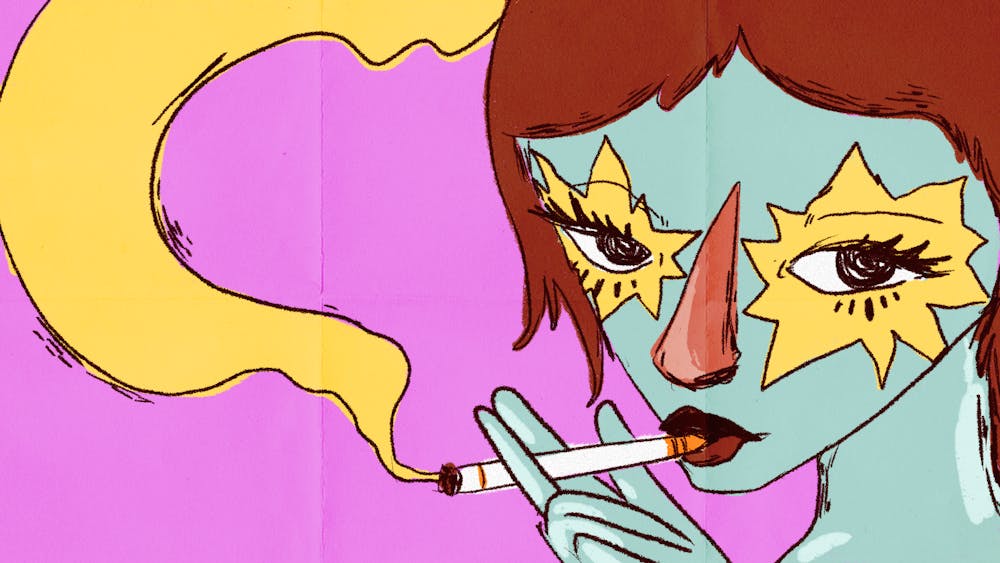Drunk cigs don’t count, but what about smoking a dart on Locust at 1:45 p.m. on a Wednesday?
Logically speaking, we know that engaging in an aspirational nicotine addiction, a post–8 p.m. steamy cup of coffee, weather–inappropriate outfits, or a DIY haircut might not be good for us. Assuming we have our own best interests at heart, why do we make these choices anyways?
I propose that these emotional support bad habits are expressions of our own individuality that stem from an awareness, and fear, of how normative we all are. As Ivy League students who are largely privileged and guaranteed a level of social status going forward, it can be disorienting to reconcile a deeply unique internal identity with an entirely conventional external one. In short, attaining conventional measures of status and success is the reason many of us came to Penn in the first place, yet sometimes it can feel like we lose sight of ourselves beyond those things. While there are ways to counter that fear—joining a cult or getting a face tattoo would definitely prove we’re not “boring”—something so extreme risks a competing psychological desire for security and belonging. It’s entirely possible to want to differentiate yourself from a homogenous in–group, and still crave the stability that being a member of the group affords.
We walk that line with superficial acts of self–destruction. Engaging in taboos because of, and despite, the fact that they won’t meaningfully alienate us from the norms we still aspire to. By negotiating the precise boundaries of acceptability within one’s community, and acting out within those borders—but just by a little bit—these emotional support bad habits allow you to feel simultaneously secure and like an individual. This allows for a training wheels type of edginess that satisfies a tension in a social environment such as Penn, where hyper–normalcy is both the goal and deeply terrifying.
Take, for example, smoking cigarettes. If you had an upbringing like mine, you were the paragon of a generation firmly convinced that cigarettes were gross. Bad for your health, bad for the environment, smelling bad, addictive—smoking seemed beyond the pale for me. After spending time abroad, I (like many others) quickly realized that the United States government's singular successful public health campaign failed to take hold outside of the United States. Seeing everyone else smoke and be just fine pushed smoking cigarettes from something I could never do, to something my environment didn’t want me to do. I see skipping class, stealing road signs, and contrarian political beliefs as other examples within that same category.
We can all think of things firmly beyond the bounds of our communities and societies, and then there are things a few steps before that. That category, the emotional support bad habit, includes the things we know won’t put us any more on the outs than we would like to be at any given moment. The acts of self–incurred, reversible individuality remind us that we don’t need to always be entirely steeped in any given group or identity, even if most of the time we would like to be. Whatever singular identity I feel taking hold gets shaken loose with a contrasting act of mini–rebellion against it. My emotional support bad habits are there to prove, mostly to myself, that I am never just one thing.
In the short term, without—God forbid—risking the security that many of us came to Penn seeking in the first place, we microdose edginess and individuality to prove, if only to ourselves, that we still can.
An acute awareness of our internalized normativity is what prompts this pursuit of edginess. Yet, that same normative sensibility means we will never actually engage in anything legitimately risky. Rather than devoting energy towards self–expression, we divide our time between doing the expressing and monitoring the boundaries of acceptability within our environment, such that our actions won’t irreversibly cross any lines. Thus, these aspirational vices are inherently performative. So you may as well have fun with it! So take your pick: chain–smoking, caffeine addiction, paganism, communist sympathies? What extreme can you dabble in carefully enough for it not to be reckless, yet intensely enough to feel a tremor in the foundation of an inherently bubble–wrapped existence?
These observations aside, avenues of nonalienating self expression can strike a balance between competing inner needs for security and individuality. Far from feeding into an addiction or an ideology for its own sake, I see engaging in these emotional support bad habits as just that: a habit. We need to have something that others push back on to know that we really exist, but is superficial enough not to meaningfully differentiate us from our peers. Our pursuit of vices such as these fills an immediate psychological need, even if they seem harmful in the moment.
Wikipedia defines a rational agent as someone who "always aims to perform optimal actions based on given premises and information.” When presenters in middle school health class showed you a lung blackened from smoking, they had a point in telling you to avoid cigarettes like the plague. The girl smoking a Marlboro outside Van Pelt, because she knows she’s gonna be there all night studying anyways, has a point too.







